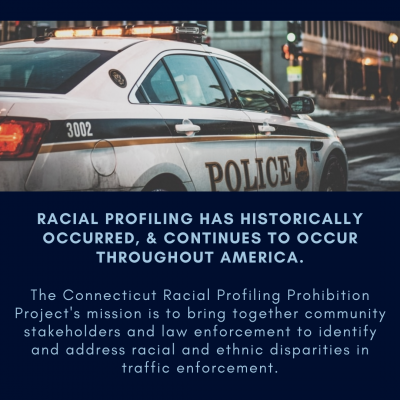 In 1999 Connecticut enacted the anti-racial profiling law known as the The Alvin W. Penn Racial Profiling Prohibition Act (Public Act 99-198). Under Connecticut General Statues this law prohibited law enforcement agency from stopping, detaining, or searching any motorist when the stop is motivated solely by considerations of the race, color, ethnicity, age, gender or sexual orientation of that individual (Connecticut General Statutes Sections 54-1l and 54-1m).
In 1999 Connecticut enacted the anti-racial profiling law known as the The Alvin W. Penn Racial Profiling Prohibition Act (Public Act 99-198). Under Connecticut General Statues this law prohibited law enforcement agency from stopping, detaining, or searching any motorist when the stop is motivated solely by considerations of the race, color, ethnicity, age, gender or sexual orientation of that individual (Connecticut General Statutes Sections 54-1l and 54-1m).
After the Connecticut General Assembly’s 2012 and 2013 session several changes were made to the law to create a system to address racial profiling concerns. An Advisory Board was established in 2012 to advise the CT Office of Policy and Management on their adoption of standardized methods and guidelines outlined in the law. The Institute for Municipal and Regional Policy’s (IMRP) Connecticut Racial Profiling Prohibition Project (CTRP3) has helped to oversee the design, evaluation and management of the racial profiling study mandated by PA 12-74 and PA 13-75, “An Act Concerning Traffic Stop Information.” Project resources have been made available through the National Highway Traffic and Safety Administration (NHTSA) grant, as administered through the Connecticut Department of Transportation.
Since May of 2012 the Advisory Board and project staff have met, outlined a plan, and successfully implemented PA 12-74 and PA 13-75. Early phases focused on better understanding traffic stop data collection and analyses in other states. After an extensive review, Data and System, Public Awareness, and Training work groups began meeting monthly to discuss different aspects of the project.
On a monthly basis project staff also submit traffic stop information electronically to Criminal Justice Information System (CJIS). They are able to do so due to a collaboration with the Advisory Board, law enforcement, software vendors and CJIS.
The CTRP3 website informs the public of the advisory board’s activities, statewide informational forums, and related news items on racial profiling. The website includes minutes, agendas, press releases, and links to register for events and the website is updated weekly. Quarterly, IMRP publishes all traffic stop data in partnership with the Connecticut Data Collaborative. The data can be downloaded in its original form or summary tables by the public.
In addition to data collection and analysis, CTRP3 provides public awareness, education and training. In 2015 and 2016 the Department of Justice, Community Oriented Policing Services division sponsored a train-the-trainer program on “Fair and Impartial Policing (FIP)” to understand conscious and unconscious bias. CTRP3 has also worked to bring law enforcement officials and community members together to discuss relationships between police and the community. They have done so through public forums throughout the state.
The first analysis of CT traffic stop data as per the revised Alvin W. Penn Act was presented to the legislature on April 7, 2015. The latest, and fifth annual report, was released in May 2020.
IMRP Project Staff includes Ken Barone, Jim Fazzalaro, Natalie Casanova and Tyler Lubin.